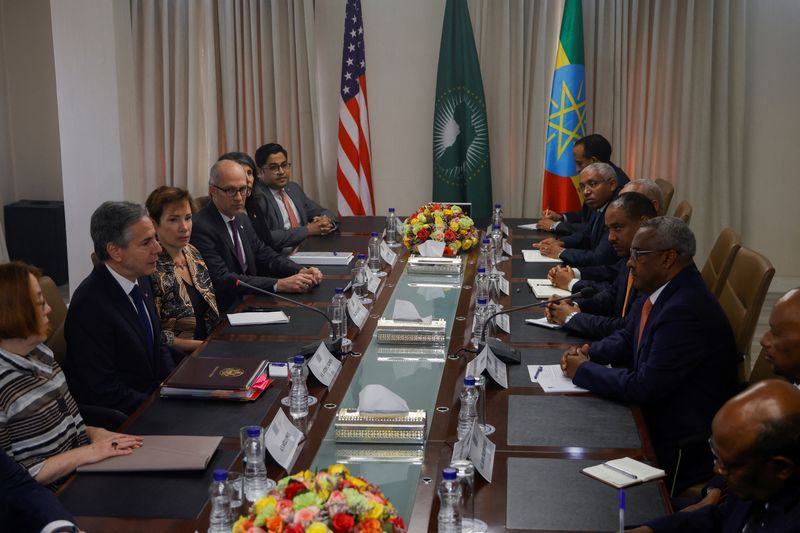By Daphne Psaledakis and Dawit Endeshaw
ADDIS ABABA (Reuters) -U.S. Secretary of State Antony Blinken praised Ethiopia on Wednesday for its progress in implementing a peace deal to end the Tigray conflict but stopped short of ushering the country back into a U.S. trade programme.
Visiting Ethiopia to repair relations that were strained by the two-year war in the northern region, Blinken met with Prime Minister Abiy Ahmed and discussed ongoing efforts to solidify peace, restore basic services and address humanitarian needs.
The Ethiopian government and forces from Tigray signed a ceasefire in November, ending a conflict that killed tens of thousands of people, left hundreds of thousands facing hunger and displaced millions.
The U.S. government restricted economic and security assistance to Ethiopia during the war and cut access to the U.S. African Growth and Opportunity Act (AGOA), a duty-free trade programme that had been a boon for the country's textile sector.
"Certainly we share the aspiration of Ethiopia returning to AGOA," Blinken told reporters after his meetings with Abiy and other government figures, adding that "it's moving in the right direction" as Ethiopia continues to implement the peace accord.
He added that Ethiopia had been given clear benchmarks and Washington would continue to work with the government in Addis to achieve the goal.
During a visit to a United Nations logistics warehouse, Blinken announced $331 million in new humanitarian aid to Ethiopia, saying this would provide life-saving support for people affected by conflict, drought and food insecurity.
His meeting with Abiy represented a reaffirmation of the important partnership between the United States and Ethiopia, State Department spokesperson Ned Price said, echoing comments from the Ethiopian leader on Twitter after the meeting ended.
"We have agreed to strengthen the long-standing bilateral relations between our countries with a commitment to partnership," Abiy said.
Blinken's trip is the latest in a series of visits to Africa by senior Biden administration officials as Washington looks to reinforce ties with a continent where China's diplomatic and economic influence is ubiquitous.
On Thursday, he will head to the West African nation of Niger, which has been confronting a growing Islamist insurgency.
'ACCOUNTABILITY FOR ATROCITIES'
The United States was outspoken in its criticism of alleged atrocities by Ethiopian forces and their allies from Eritrea and the Amhara region during the Tigray war.
Ethiopia, Africa's second most populous nation and traditionally a U.S. ally in East Africa, accused Washington of meddling in its internal affairs and threatened to reassess the bilateral relationship.
It has denied the most serious allegations of human rights violations during the war.
Blinken and Abiy discussed "the importance of accountability for the atrocities perpetrated by all parties during the conflict, as well as the need for an inclusive and comprehensive process of transitional justice," Price said.
As well as mending ties with allies, Ethiopia is also looking to restructure its debt and secure an International Monetary Fund loan, which the state finance minister said last year was being delayed in part by the Tigray war.
While the peace deal has allowed humanitarian aid to flow into Tigray, needs remain immense.
Allegation of abuses, especially sexual violence, have persisted after the deal was signed, though Blinken said human rights advocates had told him during his meeting with them on Wednesday that there had been a significant drop.
"We strongly urge all parties ... to do everything possible to ensure that they cease entirely," he said.
Eritrean troops remain in several border areas while militia from the Amhara region, which neighbours Tigray, occupy large areas of territory in contested parts of western and southern Tigray, humanitarian workers say.
Asked by reporters about the Eritrean troops, Blinken said they were departing, but the process was not complete.

Eritrea's government spokesperson has not responded to requests for comment about the actions of Eritrean troops or any other aspect of its policies.
A spokesperson for the Amhara regional government said it and the people of Amhara were "always ready to co-operate with peace deal process and activities".